Institute of Chemistry, Academia Sinica – People

Our lab focuses on the biophysical and biochemical properties of misfolded proteins associated with neurodegenerative diseases and their physiological roles in disease progression. We aim to elucidate the mechanisms of protein aggregation and their pathological impacts while developing innovative peptide-based therapeutic strategies. Current research areas include:
Chemical Synthesis and Peptide Design:We specialize in designing and synthesizing functional peptides, particularly light-responsive peptides. These peptides are engineered to self-assemble under specific environmental conditions or light stimuli, enabling precise control of their behavior. Furthermore, we are pioneering the development of peptide-based hydrogels with high biocompatibility. These hydrogels self-assemble into stable 3D structures and are optimized for neural tissue repair, controlled drug delivery, and 3D cell culture applications.
Optical Tools for Protein Aggregation Studies:Using cutting-edge real-time imaging techniques, we study the dynamic behavior of pathogenic proteins such as TDP-43 and Huntingtin. Our lab has developed light-controlled peptide systems that allow precise spatial and temporal manipulation, enabling in-depth analysis of protein aggregation mechanisms and their roles in neurodegenerative diseases.
Nanotechnology, Drug Development, and Diagnostic Platforms:We integrate nanotechnology with chemical biology to explore a wide range of applications. By functionalizing peptides on nanoparticle surfaces, we develop advanced systems for drug delivery and biosensing. Our lab also focuses on the development of small-molecule drugs and nano-scale photocontrollable probes for disease-specific targets, enabling efficient therapeutic interventions and molecular imaging. These innovations contribute to the creation of robust diagnostic platforms for early detection, disease monitoring, and therapeutic evaluation in neurodegenerative disorders.
Our interdisciplinary expertise in chemical synthesis, optical innovation, and biomaterials allows us to address fundamental questions in disease biology while advancing biomaterial engineering and translational medicine.
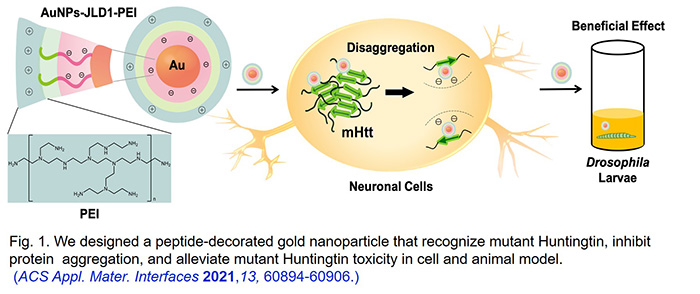
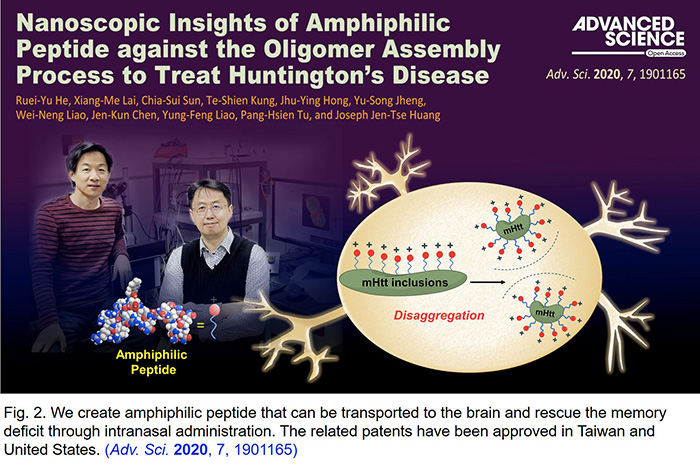
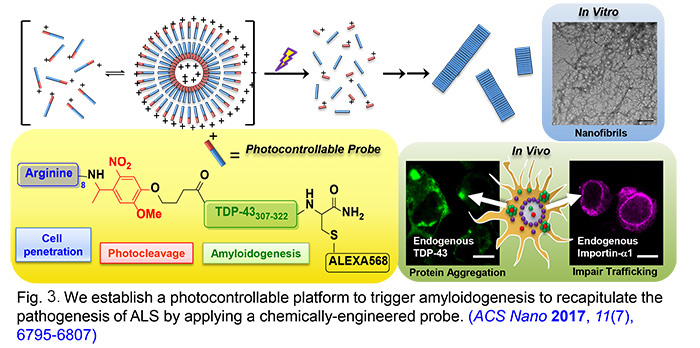
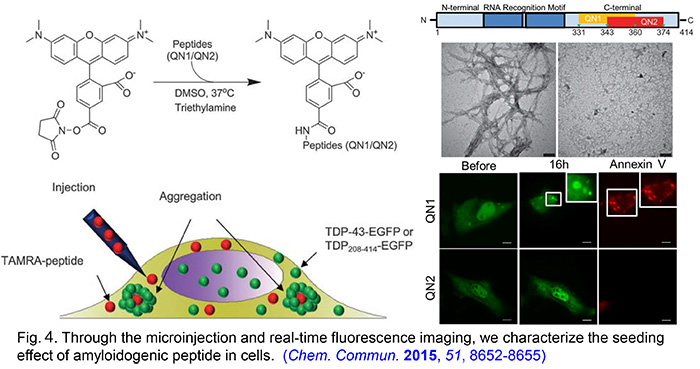
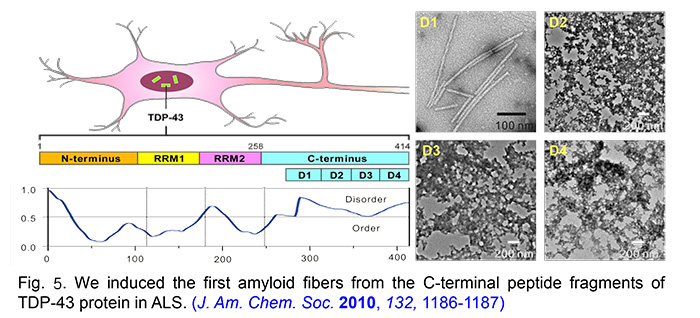
- "The 2019 Career Development Award (中研院前瞻計畫)" (2019)
- "Award received from the Taiwan Motor Neuron Disease Association(第三屆漸凍人研究獎)" (2018)
- "Ministry of Science and Technology Research Project for Excellent Young Scholars(科技部優秀年輕學者研究計畫)" (2017)
- "2012 Excellent Young Scholar Award (2012年中國化學會傑出青年化學獎章)" (2012-12)
- "Taiwan Merit Scholarship(菁英專案擴增留學計畫獎助)" (2005, 2006, 2007)
- "台灣大學理學院院長獎" (2004-07)
- "第八屆生物物理年會壁報論文比賽第一名" (2002-05)
-
JOURNAL ARTICLES:
- Chuang, H.-Y.; He, R.-Y.; Huang, Y.-A.; Hsu, W.-T.; Cheng, Y.-J.; Guo, Z.-R.; Niaz Wali, Hwang, I-S.; Shie, J.-J.; Huang, J. J.-T.* Engineered droplet-forming peptide as photocontrollable phase modulator for fused in sarcoma protein. Nature Communications 2024, 15(1), 5686-5698.
- Tseng, Y.-L., Lu, P.-C., Lee, C.-C., He, R.-Y., Huang, Y.-A., Tseng, Y.-C., Cheng, R. T.-J., Huang, J. J.-T.*,Fang, J.-M.* Degradation of neurodegenerative disease-associated TDP-43 aggregates and oligomers via a proteolysis-targeting chimera. J. Biomed. Sci. 2023, 30, 27.
- Wahyuningtyas, D.; Chen, W.-H.; He, R.-Y.; Huang, Y.-A.; Tsao, C.-K.; He,Y.-J.; Yu,C.-Y.; Lu, P.-C.; Chen,Y.-C.; Wang, S.-H.; Ng, K.-C.; Chen, P.-W.; Wei, P.-K.; Shie, J.-J.; Kuo, C.-H.; Sun,Y.-H.; Huang, J. J.-T.* Polyglutamine-Specific Gold Nanoparticle Complex Alleviates Mutant Huntingtin-Induced Toxicity. ACS Appl. Mater. Interfaces 2021, 13, 60894−60906.
- Chien, H. -M.; He, R. -Y.; Lee, C. -C.; Huang, Y. -A.; Hung, I. -J.; Hou, K. -T.; Hsiao, J. -C.; Lu, P. -C.; Agnihotri, D.; Hwang, E.; Huang, J. J.-T.* Nanoscopic investigation of C9orf72 poly-GA oligomers on nuclear membrane disruption by photoinducible platform. Commun. Chem. 2021, 4, 111.
- He, R.-Y.; Lai, X.-M.; Sun, C. -S; Kung, T.-S.; Hong, J.-Y.; Jheng, Y.-S.; Liao, W. -N.; Chen, J. -K.; Liao, Y. -F.; Tu, P. -H.; Huang, J. J. -T. Nanoscopic insights of amphiphilic peptide against oligomer assembly process to treat Huntington’s disease. Adv. Sci. 2020, 7, 1901165.
- Wahyuningtyas, D.; Chen, W.-H.; Huang, C.-H.; He, Y.-J.; Huang, J.J-T. Biocompatible Inhibitor Based on Chitosan and Amphiphilic Peptide against Mutant Huntingtin Toxicity. ChemBioChem 2019, 20, 2133-2140. (Cover Article)
- Lee, C.-C.; He, R.-Y.; Huang, J.J-T. Learning from the TDP-43 amyloidogenic sequences in neurodegenerative diseases. Amyloid 2019, 26, 154-155.
- He, R.-Y.; Chao, S.-H.; Tsai, Y.-J.; Lee, C.-C.; Yu, C.-Y.; Gao, H.-D.; Huang, Y.-A.; Hwang, E.; Lee, H.-M.; Huang, J. J-T. Photo-Controllable Probe Spatiotemporally Induces Neurotoxic Fibrillar Aggregates and Impairs Nucleocytoplasmic Trafficking. ACS Nano 2017, 11 (7), 6795-6807.
- Du, Y.-P.; Chang, H.-H.; Yang, S.-Y.; Huang, S.-J.; Tsai, Y.-J.; Huang, J..J.-T.; Chan, J.-C. Study of Binding Interaction between Pif80 Protein Fragment and Aragonite. Sci. Rep. 2016, 6, 30883.
- Chen, C-H.; Khan, A.; Huang, J. J.-T.; Ulmschneider, M.-B. Mechanisms of membrane-pore formation by amyloidogenic peptides in ALS.Chem. Eur. J. 2016, 22, 9958-9961.
- He, R.-Y.; Huang, Y.-C.; Chiang, C.-W.; Tsai, Y.-J.; Ye, T.-J.; Gao, H.-D.; Wu, C.-Y.; Lee, Y.-M.; Huang, J. J.-T. Characterization and real-time imaging of the FTLD-related protein aggregation induced by amyloidogenic peptides. Chem. Commun. 2015, 51, 8652.
- Sun, C.-S. ; Lee, C.-C.; Li, Y-N; Yang S. Y.-C.; Lin, C.-H.; Chang, Y.-C.; He, R.-Y.; Liu, P.-F.; Wang ,C.-H.; Chen, W.; Chern, Y.; Huang J. J.-T. Conformational switch of polyglutamine-expanded huntingtin into benign aggregates leads to neuroprotective effect. Sci. Rep. 2015, 5, 14992. (Recommended in F1000Prime by F1000 faculty member)
- Huang C.-C.; Bose J.-K.; Majumder P.; Lee K.-H., Huang, J. J.-T.; Huang J. K.; Shen J. C.-K. Metabolism and mis-metabolism of the neuropathological signature protein TDP-43. J. Cell Sci. 2014, 127(Pt 14), 3024..
- Liu, G. C.-H.; Chen, B. P.-W.; Ye, N. T.-J.; Wang, C.-H.; Chen, W.; Lee, H.-M.; Chan, S. I., Huang, J. J.-T. Delineating the membrane-disrupting and seeding properties of the TDP-43 amyloidogenic core. Chem. Commun. 2013, 49, 11212.
(Highlighted in Significant Research Achievements of Academia Sinica 2013)
- Huang, J. J.-T.; Larsen, R.-W.; Chan, S.-I. The Interplay of Turn Formation and Hydrophobic Interactions on the Early Kinetic Events in Protein Folding. Chem. Comm. 2012, (Feature Article), 48, 487.
-
Chen, K.-H.; Lin, Y.-Y.; Xie, Z.-J.; Tu, P.-H.; Chen, P.-Y.; Liao, T.-Y.; Huang, J. J.-T. Induction of Amyloid Fibrils by the C-terminal Fragments of TDP-43 in Amyotrophic Lateral Sclerosis. J. Am. Chem. Soc. 2010, 132, 1186.
(Highlighted in Significant Research Achievements of Academia Sinica 2010)
(Selected in 2010 Science and Technology Yearbook of Republic of China)
- Kuo, N. N.-W.; Huang, J. J.-T.; Miksovska, J.; Chen, P.-Y.; Larsen, R.; Chan, S. I. Effects of turn stability on the kinetics of refolding of a hairpin in b-sheet. J. Am. Chem. Soc. 2005, 127, 16945.
- Chen, R. P. Y.; Huang, J. J.-T.; Chen, H. L.; Jan, H.; Velusamy, M.; Lee, C. T.; Fann, W. S.; Larsen, R. W.; Chan, S. I. Measuring the refolding of beta-sheets with different turn sequences on a nanosecond time scale. Proc. Natl. Acad. Sci. U. S. A. 2004, 101, 7305.
- BOOK CHAPTER:
-
Chan, S. I.; Huang, J. J.-T.; Larsen, R. W.; Rock, R. S.; Hansen, K. C. Early kinetic events in protein folding: The development and applications of caged peptides in dynamic studies in biology. phototriggers, photoswitches, and caged biomolecules; Goeldner, M. and Givens. R. (eds), Wiley-VCH GmbH & Co. Germany, 2005, pp479.
Update: 2024-11-14
- Diksha Agnihotri; Lee ,C.-C.; Lu, P.-C.; He, R.-Y.; Huang, Y.-A.; Kuo, H.-C.; Huang, J. J.-T.* C9ORF72 poly-PR induces TDP-43 nuclear condensation via NEAT1 and is modulated by HSP70 activity. Cell Reports 2025-1, 44(1), 115173.
- Liu, Y.-J.; Lee, C.-W.; Liao, Y.-C.; Huang, J. J.-T., Kuo, H.-C.; Jih, K.-Y.; Lee, Y.-C.; Chern, Yijuang* The role of adiponectin-AMPK axis in TDP-43 mislocalization and disease severity in ALS. Neurobiology of Disease 2024-11, 202, 106715.
- Chuang, H.-Y.; He, R.-Y.; Huang, Y.-A.; Hsu, W.-T.; Cheng, Y.-J.; Guo, Z.-R.; Niaz Wali, Hwang, I-S.; Shie, J.-J.; Huang, J. J.-T.* Engineered droplet-forming peptide as photocontrollable phase modulator for fused in sarcoma protein. Nature Communications 2024, 15(1), 5686-5698.
- Tseng, Y.-L.; Lu, P.-C.; Lee, C.-C.; He, R.-Y.; Huang, Y.-A.; Tseng, Y.-C.; Cheng, R. T.-J.; Huang, J. J.-T.*; Fang, J.-M.* Degradation of neurodegenerative disease-associated TDP-43 aggregates and oligomers via a proteolysis-targeting chimera. JOURNAL OF BIOMEDICAL SCIENCE 2023, .
- Chen, B. P.-W., He, R.-Y., Chien, H.-M., Lee, C.-C., Hsu, C.-P., Chan, J .C.-C., Huang, J. J.-T.* Superresolution Imaging of Photochromic Acylhydrazone Moieties on Amyloid Nanofibrils: Implications for Photoswitchable Probes.. ACS APPLIED NANO MATERIALS 2022-01, 5(2), 1734-1739.
- Wahyuningtyas, D., Chen, W.-H., He, R.-Y., Huang, Y.-A., Tsao, C.-K., He, Y.-J., Yu, C.-Y., Lu, P.-C., Chen, Y.-C., Wang, S.-H., Ng, K.-C., Chen, P.-W., Wei, P.-K., Shie, J.-J., Kuo, C.-H., Sun, Y.-H., Huang, J. J.-T.* Polyglutamine-Specific Gold Nanoparticle Complex Alleviates Mutant Huntingtin-Induced Toxicity. ACS APPLIED MATERIALS & INTERFACES 2021-12, 13, 60894-60906.
- Chien, H.-M., He, R.-Y., Lee, C.-C., Huang, Y.-A., Hung, I.-J., Hou, K.-T., Hsiao, J.-C., Lu, P.-C., Agnihotri, D., Hwang, E., Huang, J. J.-T.* Nanoscopic investigation of C9orf72 poly-GA oligomers on nuclear membrane disruption by photoinducible platform. Communications Chemistry 2021-07, 4(111), 1-13.
- Chien, H.-M., Lee, C.-C., Huang, J. J.-T.* The Different Faces of the TDP-43 Low-Complexity Domain: The Formation of Liquid Droplets and Amyloid Fibrils. INTERNATIONAL JOURNAL OF MOLECULAR SCIENCES 2021-07, 22(15), 8213.
- He, R. -Y.*, Lai, X.-M., Sun, C. -S, Kung, T.-S., Hong, J.-Y., Jheng, Y.-S., Liao, W. -N., Chen, J. -K., Liao, Y. -F., Tu, P. -H.*, Huang, J. J.-T.* Nanoscopic insights of amphiphilic peptide against oligomer assembly process to treat Huntington’s disease. ADVANCED SCIENCE 2019-12, 1901165.
- Lee, C.-C.,He, R.-Y., Huang, J.J-T.* Learning from the TDP-43 amyloidogenic sequences in neurodegenerative diseases. AMYLOID-JOURNAL OF PROTEIN FOLDING DISORDERS 2019-07-25, 26, 154-155..
- Wahyuningtyas, D., Chen, W.-H., Huang, C.-H., He, Y.-J., Huang, J.J-T.* Biocompatible Inhibitor Based on Chitosan and Amphiphilic Peptide against Mutant Huntingtin Toxicity. CHEMBIOCHEM 2019-06, 20(16), 2133-2140..
- He, R.-Y., Chao, S.-H., Tsai, Y.-J., Lee, C.-C., Yu, C.-Y., Gao, H.-D., Huang, Y.-A., Hwang, E., Lee, H.-M., Huang, J.J-T.* Photo-controllable probe spatiotemporally induces neurotoxic fibrillar aggregates and impairs nucleocytoplasmic trafficking. ACS Nano 2017-08, 11 (7), 6795-6807.
- Koubek, J., Chang, Y.-C., Yang, S.Y.-C., Huang, J.J-T.* Trigger factor-induced nascent chain dynamics changes suggest two different chaperone-nascent chain interactions during translation. JOURNAL OF MOLECULAR BIOLOGY 2017-07, 429(11),1733-1745.
- Du, Y.-P., Chang,H.-H., Yang, S.-Y., Huang, S.-J., Tsai, Y.-J., Huang,J.J.-T.,Chan,J.C.-C. Study of Binding Interaction between Pif80 Protein Fragment and Aragonite. SCIENTIFIC REPORTS 2016, 6,30883.
- Chen, C.-H. , Khan, A. , Huang, J. J.-T. , Ulmschneider, M.-B.* Mechanisms of membrane-pore formation by amyloidogenic peptides in ALS. CHEMISTRY-A EUROPEAN JOURNAL 2016, 22, 9958-9961.
- Sun, C.-S. , Lee, C.-C., Li, Y-N, Yang S. Y.-C., Lin, C.-H., Chang, Y.-C., He, R.-Y. , Liu, P.-F., Wang ,C.-H., Chen, W. , Chern, Y., Huang, J. J.-T.* Conformational switch of polyglutamine-expanded huntingtin into benign aggregates leads to neuroprotective effect.. Scientific Reports 2015, 5,14992.
- Koubek, J., Chen, Y.-R., Cheng, R.-P.,Huang, J.J.-T.* Nonorthogonal tRNA(cys, Amber) for protein and nascent chain labeling. RNA 2015, 21,1672-1682.
- He, R.-Y., Huang, Y.-C., Chiang, C.-W., Tsai, Y.-J., Ye, T.-J., Gao, H.-D., Wu, C.-Y., Lee, Y.-M., Huang, J.J.-T.* Characterization and real-time imaging of the FTLD-related protein aggregation induced by amyloidogenic peptides. CHEMICAL COMMUNICATIONS 2015, 51, 8652-8655.
- Huang, C.-C., Bose, J.-K., Majumder, P., Lee, K.-H., Huang, J. J.-T., Huang, J.-K., Shen, C.-K.*. Metabolism and mis-metabolism of the neuropathological signature protein TDP-43. Journal of cell science 2014, 127(Pt 14), 3024-38.
- Sun, C.-S., Wang, C.-Y., Chen, B.-P., He, R.-Y., Liu, G. C.-H., Wang, C.-H., Chen, W., Chern. Y., Huang, J. J.-T.* The Influence of Pathological Mutations and Proline Substitutions in TDP-43 Glycine-Rich Peptides on Its Amyloid Properties and Cellular Toxicity. PloS one 2014, 9(8), e103644.
- Liu, G. C.-H., Chen, B. P.-W, Ye, N. T.-J., Wang, C.-H., Chen, W., Lee, H.-M., Chan, S.-I., Huang, J.J.-T.* Delineating the membrane-disrupting and seeding properties of the TDP-43 amyloidogenic core. CHEMICAL COMMUNICATIONS 2013-10, 49(95), 11212-4.
- Koubek, J., Lin, K.-F., Chen, Y.-R., Cheng, R.-P., Huang, J. J.-T.* Strong anion exchange fast performance liquid chromatography as a versatile tool for preparation and purification of RNA produced by in vitro transcription. RNA 2013-06, 19,1449-1459.
- Huang, Y.-C. Lin, K.-F., He, R.-Y., Tu, P.-H. Koubek, J., Hsu,Y.-C., Huang, J. J.-T.* Inhibition of TDP-43 aggregation by nucleic acid binding. PLoS One 2013-05, 8(5), e64002.
- Chang, C.-K., Wu, T.-H., Wu, C.-Y., Chiang, M.-H., Toh, E.-K., Hsu, Y.-C., Lin, K.-F., Liao, Y.-H., Huang, T.-H.*, Huang, J. J.-T.* The N-terminus of TDP-43 Promotes Its Oligomerization and Enhances DNA Binding Affinity.. BIOCHEMICAL AND BIOPHYSICAL RESEARCH COMMUNICATIONS 2012, 425(2), 219-224.
- Lin, K.-F., Sun, C.-S., Huang, Y.-C., Chan, S.-I., Koubek, J., Wu, T.-H., Huang, J. J.-T.* Cotranslational Protein Folding within the Ribosome Tunnel Influences Trigger-Factor Recruitment. BIOPHYSICAL JOURNAL 2012, 102, 2818-2827.
- Huang, J. J.-T., Larsen, R.-W., Chan, S.-I.* The Interplay of Turn Formation and Hydrophobic Interactions on the Early Kinetic Events in Protein Folding. CHEMICAL COMMUNICATIONS 2012, 48, 487-497.
- Allan K.-H. Chen, Ryan Y.-Y. Lin, Eva Z.-J. Hsieh, Pang-Hsien Tu, Rita P.-Y. Chen,Tai-Yan Liao, Wenlung Chen, Chih-Hsien Wang, and Joseph J.-T. Huang* Induction of Amyloid Fibrils by the C-Terminal Fragments of TDP-43 in Amyotrophic Lateral Sclerosis. JOURNAL OF THE AMERICAN CHEMICAL SOCIETY 2010, 132,1186-1187.
- Jih Ru Hwu,*Joseph Jen-Tse Huang,Fu-Yuan Tsai,Shwu-Chen Tsay,Ming-Hua Hsu,Kuo Chu Hwang,Jia-Cherng Horng,Ja-an Annie Ho,Chun-Cheng Lin Photochemical Activities of N-Nitroso Carboxamides and Sulfoximides as well as Their Application to DNA Cleavage. CHEMISTRY-A EUROPEAN JOURNAL 2009, 15, 8742-8750.
- Huang, J. J.-T.*, Jhan, J.-W. Ultra-fast and Cotranslational Protein Folding. Natural Sciences Newsletter 2008, 20,50-53.
- Kirchdoerfer RN, Huang JJ, Isola MK, Cavagnero S Fluorescence-based analysis of aminoacyl- and peptidyl-tRNA by low-pH sodium dodecyl sulfate-polyacrylamide gel electrophoresis. ANALYTICAL BIOCHEMISTRY 2007, 364(1), 92-4.
- Kuo NN, Huang JJ, Miksovska J, Chen RP, Larsen RW, Chan SI Effects of turn stability on the kinetics of refolding of a hairpin in a beta-sheet. JOURNAL OF THE AMERICAN CHEMICAL SOCIETY 2005, 127(48), 16945-54.
- Chen RP, Huang JJ, Chen HL, Jan H, Velusamy M, Lee CT, Fann W, Larsen RW, Chan SI Measuring the refolding of beta-sheets with different turn sequences on a nanosecond time scale. PROCEEDINGS OF THE NATIONAL ACADEMY OF SCIENCES OF THE UNITED STATES OF AMERICA 2004, 101(19), 7305-10.
- Chan, S. I.*, Huang, J. J.-T., Larsen, R. W., Rock, R. S., Hansen, K. C., 2005, “Early kinetic events in protein folding: The development and applications of caged peptides.”, editor(s): Goeldner, M., Givens. R., Dynamic Studies in Biology: Phototriggers, Photoswitches and Caged Biomolecules, pp. 479-494, Germany: Wiley-VCH GmbH & Co..
- Jen-Tse Huang*, 2018, “Identify amyloidogenic peptides in TDP-43 and create photocontrollable probes for neurodegenerative disease”, paper presented at The 10th International Peptide Symposium, Japan: The Liaison Committee of International Peptide Societies,, 2018-12-03 ~ 2018-12-07.
- Jen-Tse Huang*, 2018, “Learning from the Amyloidogenic Peptides in Amyotrophic Lateral Sclerosis ”, paper presented at The XVIth International Symposium on Amyloidosis, Kumamoto, Japan: ISA2018 program, 2018-05-26 ~ 2018-05-29.
- Jen-Tse Huang*, 2017, “Photo-Controllable Probe Spatiotemporally Induces Neurotoxic Aggregates in Neurodegenerative Disease”, paper presented at BIT’s 7th Annual World Congress of Nano Science & Technology-2017, Fukuoka, Japan: World High Technology Society (WHTS), 2017-10-24 ~ 2017-10-26.
- Jen-Tse Huang*, 2016, “Amyloidogenic Peptides and Proteins inNeurodegenerative Diseases”, paper presented at 2016 ITbM-IoC Joint Workshop on Biomolecules and Materials, Nagoya University, Nagoya, Japan: Institute of Transformative Bio-Molecules Nagoya University, 2016-11-15 ~ 2016-11-17.
- Jen-Tse Huang*, 2016, “Learning from the Amyloidogenic Peptides in the Neurodegenerative Diseases”, paper presented at KAUST-NTU-AS Workshop for Enhancing collaborations on Research and Education in Chemical and Materials Sciences and Engineering, King Abdullah University of Science and Technology, Thuwal/Saudi Arabia: King Abdullah University of Science and Technology, KAUST, 2016-04-01 ~ 2016-04-08.
- Jen-Tse Huang*, 2015, “ALS and FTLD-related protein aggregation induced by amyloidogenic peptides”, paper presented at PACIFICHEM 2015, Honolulu, Hawaii, USA: The International Chemical Congress of Pacific Basin Societies, 2015-12-15 ~ 2015-12-20.
- VJ,Joseph J.-T. Huang*, 2015, “Early recognition by SecA targets secretory protein near the ribosome exit tunnel”, paper presented at Protein synthesis and translational control, Germany: The European Molecular Biology Laboratory, 2015-09-09 ~ 2015-09-13.
- Koubek J,Joseph J.-T. Huang*, 2015, “The local and global effects of DnaK and Trigger Factor on ribosome-bound nascent chain dynamics”, paper presented at Molecular chaperones: From molecules to cells and misfolding diseases, Greece: EMBO Conference, 2015-05-08 ~ 2015-05-13.
- Jen-Tse Huang*, 2015, “From pathological to therapeutic peptides in neurodegenerative diseases”, paper presented at 分子科學前沿海峽兩岸交流會, 北京中國科學院化學研究所: 中國科學院化學研究所, 2015-04-24 ~ 2015-04-27.
- Joseph Jen-Tse Huang, 2014, “The amyloid and prion-like properties of the TDP-43 peptides in Amyotrophic Lateal Sclerosis”, paper presented at The 2nd Taiwan-Tohoku University Neuroscience Workshop for Young Scientists, Japan: The 2nd Taiwan-Tohoku University Neuroscience Workshop for Young Scientists, 2014-12-07 ~ 2014-12-10.
- He Ruei-Yu,Jen-Tse Huang*, 2014, “Synthetic Gluntamine/Asparagine-rich polypeptides from TDP-43 exhibit amyloid properties and induce prion-like aggregation in amyotrophic lateral scelerosis”, paper presented at The 2nd Taiwan-Tohoku University Neuroscience Workshop for Young Scientists, Japan: Taiwan-Tohoku University Neuroscience Workshop for Young Scientists, 2014-12-07 ~ 2014-12-10.
- Koubek J,Joseph J.-T. Huang*, 2014, “Development of cysteine-specific tRNA and tRNA synthetase for site-specific protein fluorescence labeling in co-translational protein folding studies”, paper presented at 25th tRNA Conference, Greece: Society of Biochemistry and Molecular Biology, the University of Patras, 2014-09-21 ~ 2014-09-25.
- Chia-Sui Sun, Yijuang Chern, Joseph J.-T. Huang*, 2014, “The modulation of FKBP12 on the mutant Huntintin-induced neurotoxicity and aggregation”, paper presented at The 19th Annual Conference of the Biophysical Society of ROC, National Chen Kung University, Tainan, Taiwan: Biophysical Society of R.O.C.Institute of Bioinformatics and Biosignal Transduction, CBB, National Chen-Kung University, 2014-05-07 ~ 2014-05-10.
- Gerard, Chun-Hao Liu, Bryan, Po-Wen Chen, Nancy, Ting-Juan Ye, Chih-Hsien Wang, Wenlung Chen, Hsien-Ming Lee, Sunney I. Chan, Joseph, Jen-Tse Huang*, 2014, “Delineating the membrane-disrupting and seeding properties of the TDP-43 amyloidogenic core”, paper presented at The 19th Annual Conference of the Biophysical Society of ROC, National Chen Kung University, Tainan, Taiwan: Biophysical Society of R.O.C.Institute of Bioinformatics and Biosignal Transduction, CBB, National Chen-Kung University, 2014-05-07 ~ 2014-05-10.
- Huang, J. J.-T.*, 2013, “From pathological to therapeutic peptides”, paper presented at The Hebrew University of Jerusalem, Israel - Academia Sinica Bilateral Workshop on Nanoscience and Nanotechnology, The Auditorium, 1F, Institute of Physics, Academia Sinica: Academia Sinica Research Program on Nanoscience and Nanotechnology, 2013-11-15.
- Huang, J. J.-T.*, 2013, “The Impact of co-Translational Protein Folding within the Ribosome Tunnel on Chaperone Recruiitment”, paper presented at Technologies for Medical Diagnosis and Therapy Symposium, B1 Auditorium, Inst. of Biomedical Sciences, Academia Sinica: Institute of Biomedical Sciences Academia Sinica, 2013-10-21 ~ 2013-10-22.
- Hsu, Y.-C., Lin, K.-F., Huang, J. J.-T*, 2013, “Characterization of the thermal induced fiber from TDP-43 and its association with single-stranded DNA”, 83 pages, paper presented at The 18th Biophysics Conference, Institute of BioMedical Sciences, Academia Sinica: Biophysical Society of R.O.C、IBMS, Academia Sinica, 2013-06-27 ~ 2013-06-29.
- Li, Y.-N., Sun, C.-S., Wu. C.-Y., Huang. J. J.-T.*, 2013, “Modulate polyglutamin protein aggregation by Trigger factor and FKBP12”, 79 pages, paper presented at The 18th Biophysics Conference, Institute of BioMedical Sciences, Academia Sinica: Biophysical Society of R.O.C、IBMS, Academia Sinica, 2013-06-27 ~ 2013-06-29.
- Vijayasarathy.K, Hsu Yin-Chih, Jiri Koubek, Joseph J.-T. Huang*, 2013, “Structure characterization of ATPase-chaperone-preprotein recognition in the secretory pathway”, 84 pages, paper presented at The 18th Biophysics Conference, Institute of BioMedical Sciences, Academia Sinica: Biophysical Society of R.O.C、IBMS, Academia Sinica, 2013-06-27 ~ 2013-06-29.
- Chang, C.-K., Chiang, M.-H., Wu, T.-H., Toh, E. K.-W., Huang, J. J.-T., Huang, T.-H.*, 2013, “Directional binding of nucleic acid to TAR DNA-binding protein (TDP-43) RRM1 domain provides insight into splicing regulation”, 69 pages, paper presented at The 18th Biophysics Conference, Institute of BioMedical Sciences, Academia Sinica: Biophysical Society of R.O.C、IBMS, Academia Sinica, 2013-06-27 ~ 2013-06-29.
- Huang, Y.-C., Lin, K.-F., He, R.-Y., Tu, P.-H. Koubek, J., Hsu,Y.-C., Huang, J. J.-T.* , 2013, “Inhibition of TDP-43 aggregation by nucleic acid binding”, 77 pages, paper presented at The 18th Biophysics Conference, Institute of BioMedical Sciences, Academia Sinica: Biophysical Society of R.O.C、IBMS, Academia Sinica, 2013-06-27 ~ 2013-06-29.
- Wu, T.-H., Chang, C.-K., Wu, C.-Y. Hsu, Y.-C., Huang, T.-H., Huang, J. J.-T.*, 2013, “C-terminal aggregation-prone domain of neurodegenerative TDP-43 is required for altering ssDNA/RNA structure”, paper presented at The 18th Biophysics Conference, Institute of BioMedical Sciences, Academia Sinica: Biophysical Society of R.O.C、IBMS, Academia Sinica, 2013-06-27 ~ 2013-06-29.
- Huang, J. J.-T.*, 2013, “Complementary paradigm and insight towardmodulating TDP-43 aggregation via nucleic acid binding”, paper presented at Institute for Protein Research Seminar 2013, Osaka, Japan: Institute for Protein Research, 2013-06-19 ~ 2013-06-20.
- Jen-Tse Huang*, 2013, “The different faces of the intrinsically disordered TDP-43 in Amyotrophic Lateral Sclerosis”, paper presented at Academia Sinica and UC Davis Neuroscience Symposium, University of california, San Francisco: UC Davis Neuroscience ,NPAS, 2013-04-22 ~ 2013-04-24.
- Yi-Ni Li , Chia-Sui Sun , Chu-Ya Wu , Joseph J.-T. Huang* , 2012, “The influence of molecular chaperones on the mHtt protein aggregation process”, paper presented at 2012 Annual Meeting of Chemical Society, Department of Chemistry, National Cheng-Kung University: Department of Chemistry, National Cheng-Kung University, 2012-12-01 ~ 2012-12-02.
- Yi-Chen Huang, Jen-Tse Huang*, 2012, “Exploring the roles of DNA/RNA on TDP-43 aggregation in Amyotrophic Lateral Sclerosis”, 64 pages, paper presented at The 12th Annual Meeting of the Protein Science Society of Japan, Nagoya, Japan: Protein Science Society of Japan, 2012-06-20 ~ 2012-06-23.
- Jen-Tse Huang* , 2012, “Co-translational Protein Folding: The Journey from the Ribosome Tunnel to Cellular Function”, 71 pages, paper presented at The 12th Annual Meeting of the Protein Science Society of Japan, Nagoya, Japan: Protein Science Society of Japan, 2012-06-20 ~ 2012-06-23.
- Ku-Feng Lin, Joseph Jen-Tse Huang* , 2012, “Co-translational protein folding within the ribosome tunnel influences trigger-factor recruitment”, paper presented at The 17th Biophysics Conference, Institute of BioMedical Sciences, Academia Sinica: Biophysical Society of R.O.C、IBMS, Academia Sinica, 2012-05-23 ~ 2012-05-25.
- Joseph Jen-Tse Huang, 2012, “The impact of mutations in TDP-43 fragments on the formation of amyloid fibers and cellular toxicity”, paper presented at The 17th Biophysics Conference, Institute of BioMedical Sciences, Academia Sinica: Biophysical Society of R.O.C、IBMS, Academia Sinica, 2012-05-23 ~ 2012-05-25.
- Liu, G. C.-H., Huang, J. J-T.*, 2012, “Characterization of the aggregation properties of amyloid core in the TDP-43 C-terminal fragments”, paper presented at The 17th Biophysics Conference, Institute of BioMedical Sciences, Academia Sinica: Biophysical Society of R.O.C、IBMS, Academia Sinica, 2012-05-23 ~ 2012-05-25.
- Joseph Jen-Tse Huang*, 2012, “Exploring the Co-translational Protein Folding Process with Novel Biophysical and Chemical Approaches”, paper presented at Frontiers in Chemistry-A symposium dedicated to the memory of Prof. Ta-shue Chou, 中央研究院化學所周大紓講堂: 中央研究院化學所, 2012-02-21.
- Huang, J.-T., 2011, “Applying Novel Biophysical and Chemical Approaches in Co-translational Protein Folding Studies”, paper presented at 2011Annual Meeting of Chemical Society, National Tsing Hua University, Hsinchu: National Tsing Hua University, 2011-12-03 ~ 2011-12-04.
- Chia-Sui Sun, Ruei-Yu He, Yijuang Chern, Joseph J.-T. Huang*, 2011, “Characterize the aggregation process of the mHtt protein in the presence of chaperone”, paper presented at France-Taiwanesse Symposium on Neurobiology, IGBMC, France: IGBMC, 2011-11-28 ~ 2011-11-29.
- Huang, J.-T., 2011, “The Discovery of the Amyloid Fibrils from the C-terminal Fragments of TDP-43 in Amyotrophic Lateral Sclerosis”, paper presented at The 1st International Kyoto Conference on Organic Nanostructures, Kyoto University, Kyoto, Japan: Kyoto University, 2011-11-10.
- Huang, J.-T., 2011, “The Discovery of the Amyloid Fibrils from the C-terminal Fragments of TDP-43 in Amyotrophic Lateral Sclerosis”, paper presented at The 11th Tateshina Conference on Organic Chemistry, Nagoya, Japan: The 11th Tateshina Conference on Organic Chemistry, 2011-11-11 ~ 2011-11-13.
- Huang, J.-T., 2011, “Light up the folding zone within the ribosome tunnel”, paper presented at Sunney Chan Symposium 2011, Chou Ta-Shue Lecture Hall, Institute of Chemistry, Academia Sini: Institute of Chemistry, Academia Sinica, 2011-10-05.
- Huang, J.-T., 2011, “The impact of co-translational protein folding within the ribosome tunnel on chaperone recruitment”, paper presented at The 16th Biophysics Conference, National Dong Hwa University, Hua Lien: Biophysical Society of Taiwan R.O.C, 2011-05-18 ~ 2011-05-21.
- Huang, J.-T., 2010, “ Induction of amyloid fibrils by the TDP-43 fragments in ALS”, paper presented at 2010 Pacifichem Symposium, Honolulu, Hawaii, USA: Hawaii, USA, 2010-12-15 ~ 2010-12-20.
- Huang, J.-T., 2010, “ Explore the impact of ribosome tunnel on co-translational protein folding and chaperone recruitment”, paper presented at 2010 Annual meeting of Chinese Society, 台北: 台灣大學, 2010-12-04 ~ 2010-12-05.
- Joseph Jen-Tse Huang, 2009, “The Induction of TDP-43 C-terminal Fragment into Amyloid Fibrils by G294A Mutation in Amyotrophic Lateral Sclerosis”, p27 pages, paper presented at Frontier of Protein Aggregation and Neurodegenerative Diseases, 中央研究院生物化學研究所: 中央研究院生物化學研究所、中央研究院生物醫學研究所、中央研究院細胞與個體生物學研究所、中央研究院化學研究所、中央研究院基因體中心、中央研究院分子生物研究所, 2009-06-04.
- Ku-Feng Lin, Chia-Sui Sun, and Joseph Jen-Tse Huang* , 2009, “Study on Cotranslational Protein Folding within the Ribosomal Exit Tunnel”, paper presented at Joint International Conference of Biophysics and 14th Annual Conference of the Biophysical Society of ROC, 國立成功大學: Biophysical Society of ROC, 2009-06-24 ~ 2009-06-27.
- Allan K.-H. Chen, Ryan Y.-Y. Lin, Eva Z.-J. Xie, and Joseph J.-T. Huang*, 2009, “Mutation in TDP-43 C-terminal Fragment can Induce Beta-Amyloid Fibril Formation”, paper presented at Joint International Conference of Biophysics and 14th Annual Conference of the Biophysical Society of ROC, 國立成功大學: Biophysical Society of ROC, 2009-06-24 ~ 2009-06-27.
- 黃人則、陳長謙、林谷峰, 2012, “蛋白質摺疊:從核醣體到細胞功能的旅程”, 中央研究院週報-知識天地專刊, 1364期.
- Bipartite Molecules and Uses Thereof in Treating Diseases Associated with Abnormal Protein Aggregates
USA: US10,882,890 B2 2021 - 用以偵測類澱粉沉積蛋白之探針及方法 PROBES AND METHODS FOR DETECTING AMYLOIDOGENIC PROTEINS
Taiwan: I649091 2019 - 雙鏈分子(Bipartite)及其於治療異常蛋白聚集之用途
Taiwan: I587868 2017


